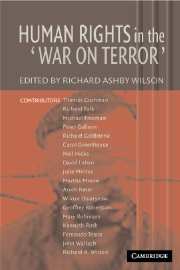Book contents
- Frontmatter
- Contents
- List of Contributors
- Acknowledgements
- HUMAN RIGHTS IN THE ‘WAR ON TERROR’
- Introduction
- 1 Order, Rights and Threats: Terrorism and Global Justice
- 2 Liberal Security
- 3 The Human Rights Case for the War in Iraq: A Consequentialist View
- 4 Human Rights as an Ethics of Power
- 5 How Not to Promote Democracy and Human Rights
- 6 War in Iraq: Not a Humanitarian Intervention
- 7 The Tension between Combating Terrorism and Protecting Civil Liberties
- 8 Fair Trials for Terrorists?
- 9 Nationalizing the Local: Comparative Notes on the Recent Restructuring of Political Space
- 10 The Impact of Counter Terror on the Promotion and Protection of Human Rights: A Global Perspective
- 11 Human Rights: A Descending Spiral
- 12 Eight Fallacies About Liberty and Security
- 13 Our Privacy, Ourselves in the Age of Technological Intrusions
- 14 Are Human Rights Universal in an Age of Terrorism?
- 15 Connecting Human Rights, Human Development, and Human Security
- 16 Human Rights and Civil Society in a New Age of American Exceptionalism
- Index
- References
15 - Connecting Human Rights, Human Development, and Human Security
Published online by Cambridge University Press: 18 August 2009
- Frontmatter
- Contents
- List of Contributors
- Acknowledgements
- HUMAN RIGHTS IN THE ‘WAR ON TERROR’
- Introduction
- 1 Order, Rights and Threats: Terrorism and Global Justice
- 2 Liberal Security
- 3 The Human Rights Case for the War in Iraq: A Consequentialist View
- 4 Human Rights as an Ethics of Power
- 5 How Not to Promote Democracy and Human Rights
- 6 War in Iraq: Not a Humanitarian Intervention
- 7 The Tension between Combating Terrorism and Protecting Civil Liberties
- 8 Fair Trials for Terrorists?
- 9 Nationalizing the Local: Comparative Notes on the Recent Restructuring of Political Space
- 10 The Impact of Counter Terror on the Promotion and Protection of Human Rights: A Global Perspective
- 11 Human Rights: A Descending Spiral
- 12 Eight Fallacies About Liberty and Security
- 13 Our Privacy, Ourselves in the Age of Technological Intrusions
- 14 Are Human Rights Universal in an Age of Terrorism?
- 15 Connecting Human Rights, Human Development, and Human Security
- 16 Human Rights and Civil Society in a New Age of American Exceptionalism
- Index
- References
Summary
The subject matter of this edited volume on “Human Rights in the ‘War on Terror’” could not be more significant for the human rights community. Sufficient time has passed since the terrible attacks of September 11, 2001, for us to answer in more depth Michael Ignatieff's question as to “whether the era of human rights has come and gone?”
I first answered that question in June 2002, as U.N. High Commissioner for Human Rights, when I delivered the Fifth Commonwealth Lecture in London, as follows:
Not gone, is my response, but we are challenged in new ways to respond to profound concerns over human security in our world today. My own sense is that there is an enormous responsibility to uphold rigorously international human rights standards, recognizing that they, too, are the object of terrorist attacks. At the same time, I believe there must be more commitment to the implementation of those standards in practice through strong support for human rights capacity building at national level.
As Arthur Chaskalson, Chief Justice of the Constitutional Court of South Africa, puts it, “We have to be vigilant from the very beginning; if you concede the first step, every next step will lead to the further erosion of the rule of law and disregard of human dignity.”
The failure of the U.S. Congress and the media, among others, to be vigilant in the aftermath of 9/11 led to a rapid erosion of civil liberties and the misuse of immigration laws, as was well documented in the report Assessing the New Normal (2003) by Lawyers Committee for Human Rights (now Human Rights First).
- Type
- Chapter
- Information
- Human Rights in the 'War on Terror' , pp. 308 - 316Publisher: Cambridge University PressPrint publication year: 2005
References
- 5
- Cited by



